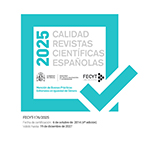Conocimiento y percepción emocional en una muestra de futuros docentes
Resumen
Dada la importancia que en la investigación se le ha otorgado a la estimulación de la Inteligencia Emocional (IE) desde los primeros niveles instruccionales, es fundamental tener en cuenta el conocimiento de IE que los estudiantes universitarios en Educación adquieren durante su formación. Por ello, en este estudio se analiza el conocimiento de IE y su actitud hacia el aprendizaje en una muestra de futuros docentes en función de su nivel de IE auto-percibido. Así como, se trata de identificar la percepción que los participantes tienen sobre la importancia del trabajo de la IE en el aula y los momentos en los que consideran más adecuada su implementación. Han participado 183 alumnos del Grado de Educación Primaria y de la programación conjunta de estudios oficiales de grado en Educación Infantil y Grado en Educación Primaria, de dos centros universitarios de la Región de Murcia (España), de los cuales 38 son chicos (20.80 %), con edades comprendidas entre los 18 y los 56 años (M = 21.86; DT = 5.31). Para dar respuesta a los objetivos propuestos, se han utilizado diferentes instrumentos; por un lado, un cuestionario diseñado ad-hoc, en el que se contempla el nivel de formación en IE que presentan los estudiantes, así como, la actitud que estos tienen hacia su aprendizaje. Y, por otro, se ha utilizado el Trait Meta-Mood Scale (TMMS-24). Escala rasgo de metaconocimiento de los estados emocionales. Los resultados apuntan que aquellos estudiantes que se autoperciben más competentes a nivel emocional también perciben tener un mayor conocimiento sobre cómo estimular la IE en sus futuros alumnos.
Descargas
Descarga artículo
Licencia
La Revista Complutense de Educación, para fomentar el intercambio global del conocimiento, facilita el acceso sin restricciones a sus contenidos desde el momento de su publicación en la presente edición electrónica, y por eso es una revista de acceso abierto. Los originales publicados en esta revista son propiedad de la Universidad Complutense de Madrid y es obligatorio citar su procedencia en cualquier reproducción total o parcial. Todos los contenidos se distribuyen bajo una licencia de uso y distribución Creative Commons Reconocimiento 4.0 (CC BY 4.0). Esta circunstancia ha de hacerse constar expresamente de esta forma cuando sea necesario. Puede consultar la versión informativa y el texto legal de la licencia.











